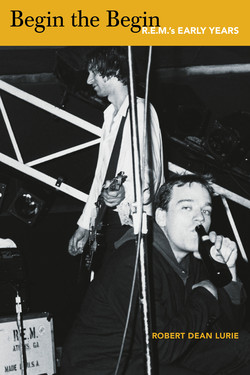Отрывок из книги
Begin the Begin
R.E.M.’s Early Years
.....
But beneath the contrasts in Mills’s and Berry’s exteriors lay some notable similarities. For one thing, both could play a variety of instruments. In addition to the aforementioned horns—and bass, of course—Mills was proficient on piano and guitar and had a solid grasp of music theory. Berry, too, could navigate the piano, guitar, and ukulele, though his approach to music was more intuitive and less schooled than that of his new friend. Both young men came from households in which music was appreciated. Mills’s father, Fred, had been an operatic tenor and instilled in his son a love of melody from an early age. Bill Berry’s passion for music had been sparked by an older sibling. “I was five or six when my older brother bought Meet the Beatles and listened to it incessantly,” he told reporter Erin Rossiter in 2007. “Well, I met the Beatles all right, and it was a magical revelation.” Both listened to a wide variety of musical genres and paid little attention to what their peers considered to be cool. They liked what sounded good to them. For Mills this included Seals and Crofts, Harry Nilsson, and even a bit of Yes. For Berry it included Gene Krupa and all things Motown. Mills and Berry were, in fact, kindred musical spirits. They were both highly unorthodox players: Berry a self-styled “basher” more interested in the overall structure and cohesion of a song than in innovating on his particular instrument, Mills favoring a high-on-the-neck lead bass style (think Paul McCartney’s noodly bass line on the Beatles’ “Rain”). In light of these philosophical bonds, then, it becomes easier to understand why two supposedly opposite personalities became the fastest of friends and decades-long bandmates.
Berry and Mills, like Kathleen O’Brien, Paul Butchart, and others in their future peer group, were affected by the wave of desegregation policies that had begun in the 1960s and escalated sharply with the Supreme Court’s 1969 order that all US public school districts desegregate “at once.” The court had offered no practical instructions for achieving this aim, which threw open the door to all manner of well-meaning (but not always successful) social experiments. One of these was busing, which involved transporting kids to schools outside their own (typically segregated) neighborhoods in order to create a more even racial mix. In the South this meant that some black students found themselves bussed great distances in order to attend school with white students, while some white students found themselves getting bussed in the opposite direction. Both Mike and Bill ended up attending a high school that was 80 percent black. For the most part they navigated these circumstances about as well as teenagers could be expected to, though Bill did run afoul of some of the black male students over his perceived interest in a black girl. “(She and I) would sit around the lunch room discussing things,” he said. “But it wasn’t long before she suddenly stopped paying attention to me. The day after she wouldn’t even talk to me, six black guys jumped me and beat me up.”
.....
